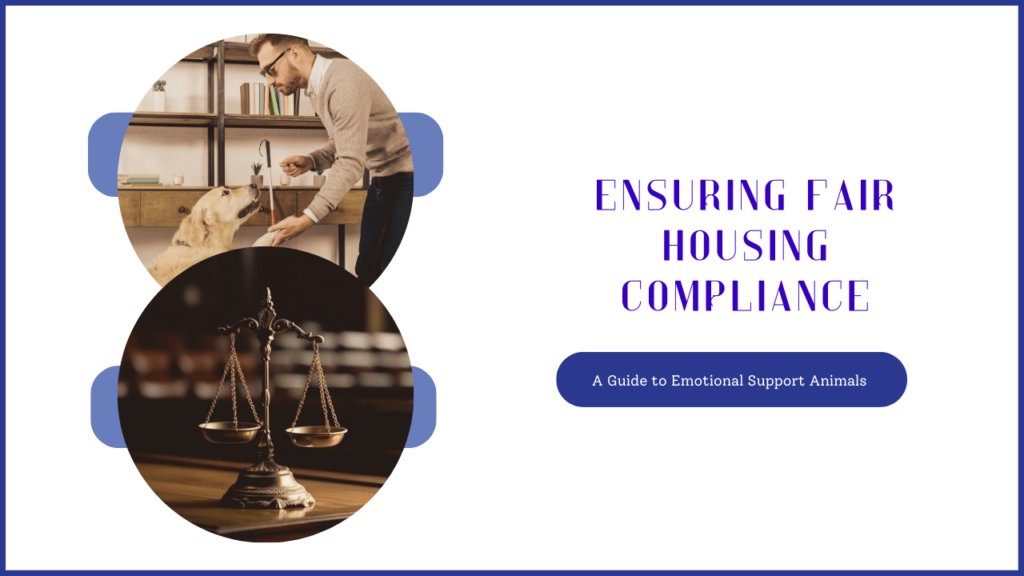
How comfortable are you with your ability to manage a request from a tenant for an emotional support animal?
If you’re like most California landlords, you’re probably familiar with the Fair Housing Act (FHA) and its rules regarding discrimination in housing. Lately, one of the hot topics in fair housing and property management has been the subject of emotional support animals (ESAs). Under the FHA, tenants with disabilities are entitled to reasonable accommodations for their emotional support animals, even in rental homes with a no-pet policy.
Emotional support animals are different from service animals, but they’re also not considered pets. It can get confusing when you’re unsure of what you’re allowed to require (such as medical documentation) and what you absolutely cannot ask for (a pet fee, for example).
We’re providing a brief guide to ESAs as your professional property management resource in San Jose and the surrounding areas. Here’s how to handle those ESA requests.
What is an Emotional Support Animal (ESA)?
An emotional support animal is an animal that provides therapeutic benefits to an individual with a mental or emotional disability. Unlike service animals, which are trained to perform specific tasks for individuals with disabilities, ESAs do not have to be specially trained. Their role is primarily to alleviate symptoms associated with mental health conditions such as anxiety, depression, or post-traumatic stress disorder (PTSD).
ESAs and Your Legal Obligations
Your obligations regarding emotional support animals come from both federal and state law:
- The Fair Housing Act (FHA)
The FHA prohibits discrimination in housing based on disability, which includes the need for emotional support animals. If a tenant provides proper documentation supporting the need for an ESA, you must allow the animal to live with them, even if your policy is not to allow pets.
- California Fair Employment and Housing Act (FEHA)
California law follows federal law in many ways, and it extends additional protections for individuals with disabilities. Under the FEHA, housing providers are required to make reasonable accommodations for individuals with disabilities, including emotional support animals. This law applies to most housing situations, including private landlords, rental properties, and housing associations.
- Reasonable Accommodation
What are those reasonable accommodations, exactly? As a landlord, you are required to make reasonable accommodations for a tenant’s emotional support animal, unless doing so would result in an undue burden or fundamental alteration to the property. An example of an undue burden might include a tenant requesting to keep a large number of animals that would disrupt the property’s operations or safety.
What to Expect from Tenants Requesting an ESA
Here’s how things will generally go down when an incoming tenant or an existing tenant informs you that they need an ESA. Tenants requesting an emotional support animal must follow a clear and respectful process.
- Tenant Requests the Accommodation
A tenant seeking an ESA accommodation should make the request in writing, but it is not required for the tenant to specifically use the term “emotional support animal.” Instead, they should simply explain that they have a disability, and that the ESA is necessary to assist with their condition.
Once you receive an ESA request, act promptly. Respond in a timely manner and avoid unnecessary delays that could be viewed as discriminatory. If the request is valid, let the tenant know their accommodation is approved, and update your records accordingly.
- Ask for Documentation from a Qualified Professional
While you cannot ask for specific details about the tenant’s disability, you can request documentation to support their need for an ESA. Typically, this documentation will come from a licensed healthcare provider such as a doctor, therapist, or counselor. The document should verify that the tenant has a disability, and that the animal provides therapeutic benefits to alleviate symptoms related to that disability.
In general, you are allowed to ask questions to clarify the need for the ESA. However, you must avoid asking for details about the tenant’s medical history or the specific nature of their disability. Your role is to assess whether the requested accommodation is reasonable and necessary for the tenant to enjoy their housing, not to judge the validity of their disability.
- Ensure Safety and Cleanliness Standards Are Met
While you are required to allow the ESA, you can still enforce standard property rules concerning safety, cleanliness, and noise. You may ask the tenant to ensure the animal does not pose a threat to other residents or cause disruptions.
How to Handle Situations of Aggressive Behavior or Damage
If an ESA behaves aggressively or damages property, the tenant can be held accountable just like any other tenant. You can request the tenant to take corrective action, such as removing the animal from the property if its behavior is problematic. However, you cannot remove the ESA solely based on its breed, size, or other characteristics unrelated to behavior.
Common Mistakes to Avoid with Emotional Support Animals
These are some of the most common pitfalls for landlords who are dealing with emotional support animals. Make sure you’re prepared to avoid them.
- Discriminating Based on the Animal’s Breed, Size, or Type. The Fair Housing Act does not allow discrimination based on the breed, size, or type of animal. As long as the animal is necessary for the tenant’s disability, it cannot be denied.
- Charging Extra Fees for ESAs. Landlords are prohibited from charging pet fees or deposits for emotional support animals. However, you can charge for damages caused by the ESA, just like you would for any other tenant damage.
- Refusing an ESA Based on a Lack of Training. Unlike service animals, ESAs do not require specific training. Denying an ESA due to lack of training is a violation of the law.
Ensuring fair housing compliance when it comes to emotional support animals is essential for maintaining a good relationship with your tenants. It also keeps you out of trouble. By understanding the basics of the FHA, FEHA, and best practices for managing ESA requests, you can protect yourself from legal trouble while accommodating tenants in need.
 We know this can be a tricky area for a lot of landlords. If you’re uncertain about any specific situation, we are here to help you avoid common mistakes and potential legal claims. Contact us at Aborn Properties, and we’ll make sure you’re following the law while protecting your property.
We know this can be a tricky area for a lot of landlords. If you’re uncertain about any specific situation, we are here to help you avoid common mistakes and potential legal claims. Contact us at Aborn Properties, and we’ll make sure you’re following the law while protecting your property.

 Andrea Caldwell
Andrea Caldwell Roy Kellett
Roy Kellett Joi Walker, MPM®, RPM®, MBA
Joi Walker, MPM®, RPM®, MBA Gary Walker, Broker/Owner
Gary Walker, Broker/Owner